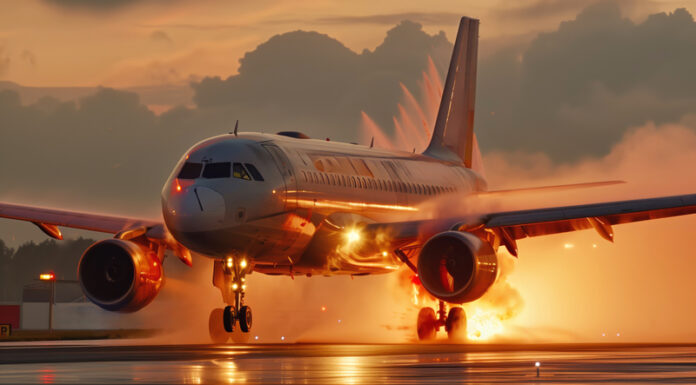A Garuda Indonesia Boeing aircraft was forced to make an emergency landing on May 15, 2024, after one of its engines caught fire shortly after takeoff.
The incident occurred on flight GA-1105, which was carrying 468 passengers, including many on their way to Mecca for the Hajj pilgrimage, and 18 crew members. The flight had departed from Sultan Hasanuddin International Airport in Makassar, Indonesia, bound for Medina, Saudi Arabia.
According to Garuda Indonesia, flames were observed shooting from the plane’s number four engine, located on the outboard right wing, just as the aircraft began its ascent. Videos circulating on social media captured the sight of orange flames trailing from the engine, prompting immediate concern among those on board and those watching from the ground.
“The decision was made by the pilot in command immediately after takeoff, considering engine problems that required further examination after sparks of fire were observed in one of the engines,” stated Irfan Setiaputra, president-director of Garuda Indonesia. The plane safely returned to Makassar, where all passengers and crew were evacuated without injury.
The crew’s quick and composed response was crucial in preventing what could have been a catastrophic event. Demonstrating their training and adherence to safety protocols, the pilots climbed to a safe altitude before making the return to Makassar. This maneuver ensured that the aircraft could land safely, minimizing the risk to those on board.
Passengers were provided with accommodation and later rebooked on alternative flights to continue their journey to Saudi Arabia. Meanwhile, the aircraft remained grounded for a thorough investigation into the cause of the engine fire. The engine in question was identified as a Pratt & Whitney PW4056, a model that has been under scrutiny in recent months due to several similar incidents.
This event adds to a growing list of safety concerns for Boeing. The manufacturer has faced a series of mechanical failures and incidents involving various aircraft models, leading to increased scrutiny and investigations. Earlier this year, an Alaska Airlines flight experienced a door plug blowout at 16,000 feet, and a United Airlines Boeing 737 Max 8 veered off the runway in Houston due to a gear collapse.
The ongoing issues have not only raised safety concerns but have also contributed to an aircraft shortage. This shortage threatens to disrupt travel plans for many, especially as the summer travel season approaches. “Airlines are desperate for aircraft because of the production problems but the well is dry,” said Gediminas Ziemelis, chairman of Avia Solutions, the world’s largest aircraft leasing company. He predicts that many airlines will be forced to cancel routes and reduce their summer services due to the shortage.
The aviation industry and regulatory authorities continue to monitor and investigate these incidents to ensure passenger safety and prevent future occurrences. As investigations into the Garuda Indonesia flight continue, passengers and airlines alike remain cautious, hoping for swift and effective solutions to the persistent issues plaguing Boeing aircraft.








